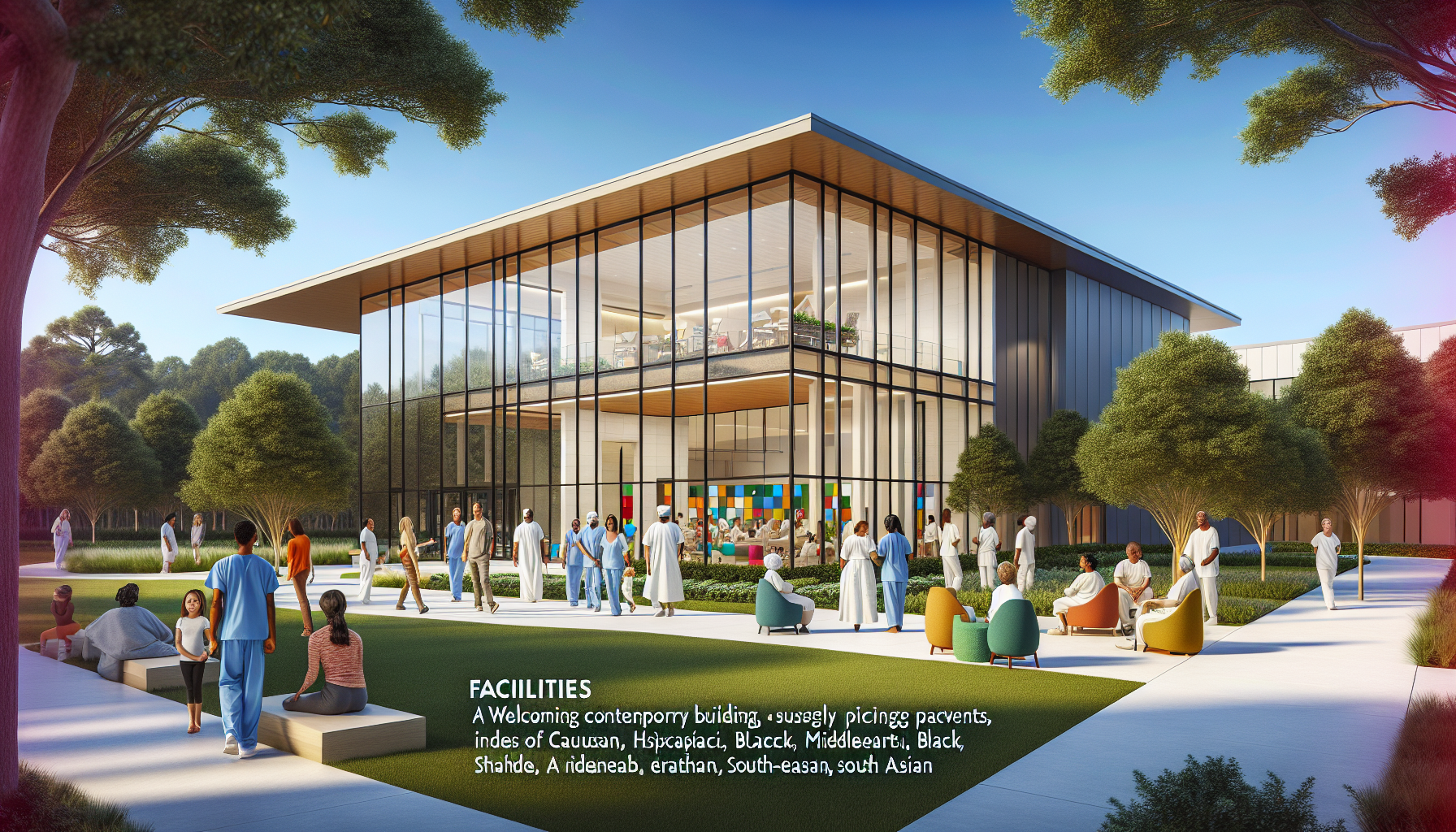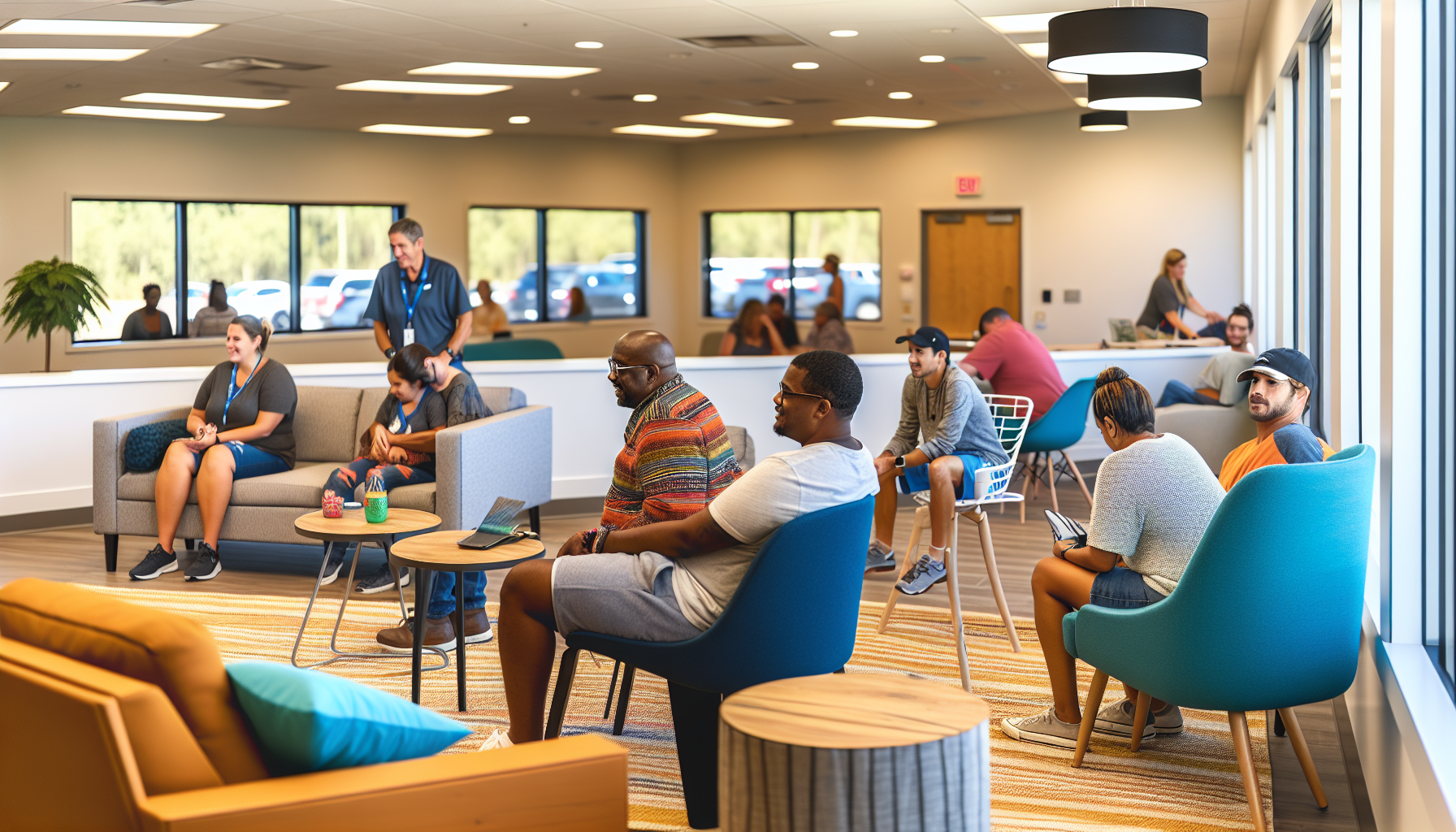Navigating the path to sobriety starts with choosing the right alcohol rehab South Carolina. From the diverse array of accredited treatment centers to detailed aftercare plans, this guide offers straightforward information essential for making an informed decision in the pursuit of alcohol-free living in South Carolina.
Key Takeaways
- South Carolina provides a comprehensive range of alcohol rehab services, including inpatient, outpatient, detox, and aftercare programs, tailored to meet individual needs and supported by highly-qualified medical professionals and accredited facilities.
- Rehab centers in South Carolina integrate holistic approaches, offer specialized programs for different demographics, and emphasize the importance of mental health treatment with facilities catering to dual-diagnosis patients.
- Multiple payment options, including Medicaid, Medicare, private insurance, and financial assistance, are available in South Carolina to make alcohol rehab services accessible, with additional support for families and aftercare services to prevent relapse.
Alcohol Rehab Centers in South Carolina: An Overview

South Carolina boasts 85 licensed alcohol and drug rehab centers, each regulated by the South Carolina Department of Alcohol and Other Drug Abuse Services. These centers uphold high-quality standards through accreditations from reputable organizations such as CARF and the Joint Commission.
The quality of care offered in these centers is further elevated by the expertise of their staff. With teams comprising:
- medical doctors
- psychiatrists
- psychologists
- specialized counselors
You are assured of receiving top-notch addiction treatment services, including addiction medicine, from reliable addiction treatment providers.
Yet, the quality of a rehab center goes beyond accreditations and experts, extending to the amenities and services provided. In South Carolina, rehab facilities feature amenities like pools, gyms, and holistic activities such as yoga. Such offerings can significantly influence the choice of a rehab facility.
Types of Alcohol Rehab Programs in South Carolina

South Carolina offers a wide range of rehab programs to battle alcohol addiction, including:
- Inpatient treatment
- Outpatient treatment
- Detox programs
- Aftercare services
There’s a suitable recovery path for every individual in South Carolina.
We’ll explore these options in more detail.
Inpatient Treatment
Inpatient treatment programs in South Carolina typically range from 28 days to several months, depending on individual needs. These programs offer a structured environment, featuring scheduled therapy sessions, activities, and support groups. This structure provides a sense of routine, which can be incredibly beneficial during recovery.
However, inpatient treatment involves more than just a structured program. In South Carolina, inpatient rehab centers emphasize the creation of a supportive community amongst residents. This sense of communal support and accountability can be a pivotal factor in successful recovery.
Outpatient Treatment
Not everyone can commit to inpatient treatment. For those needing to maintain their work and family responsibilities while accessing addiction care, outpatient treatment programs in South Carolina offer the perfect solution. With evening and weekend sessions often available, these programs can accommodate even the busiest schedules.
The adaptable nature of outpatient treatment does not equate to a reduced level of care. Intensive Outpatient Programs (IOP) cater to individuals needing a more demanding treatment regimen than traditional outpatient care, yet less restrictive than inpatient services. For those needing a higher level of care similar to inpatient treatment, Partial Hospitalization Programs (PHP) are available, allowing patients to return home each day.
Outpatient programs in South Carolina are equipped with community-based approaches, specialized accommodations, and evidence-based therapies to treat addiction and co-occurring mental health disorders.
Detox Programs
Detoxification is generally the initial step before embarking on any treatment program. It’s intended to safely manage the physical withdrawal from alcohol and prepare individuals for further treatment. South Carolina offers medical detox programs that provide continuous medical supervision to ensure safety and minimize withdrawal discomfort. These programs tailor individualized plans to each client’s needs.
Incorporating medication-assisted treatment, South Carolina detox programs manage withdrawal symptoms and promote recovery using addiction medications alongside psychosocial therapies. This emphasis on a medically supervised environment from the start often leads to comprehensive recovery journeys.
Choosing the Right Alcohol Rehab Center in South Carolina

The process of selecting an alcohol rehab center entails an in-depth evaluation of individual treatment needs, such as the types of substances abused, the duration of misuse, and the effect on daily life. South Carolina treatment centers offer a wide array of rehab approaches and amenities, from holistic methods such as yoga to specialized programs for different demographics.
Evaluating a rehab center’s reputation for success, level of staff engagement, and maintenance of privacy can provide further insights. The location of the alcohol rehab center also plays a significant role. It affects:
-
the ability for family involvement
-
may either provide a sense of comfort through proximity
-
help remove an individual from their usual environment and associated triggers.
Top Alcohol Rehab Centers in South Carolina

South Carolina is home to a variety of top-tier alcohol rehab centers offering diverse treatment options and amenities. One of these is Lantana Recovery, known for its comprehensive treatment services. They can be contacted at Lantana Recovery for cost details of a 28-day program costing around $13,000.
BriteLife Recovery, located on Hilton Head Island, offers inpatient services for private pay clients, and can be contacted at 866-470-2187. Waypoint Recovery Center in Cameron also provides inpatient treatment with services available for private pay, and they can be reached at 888-978-5188.
Charleston Recovery Center in Charleston provides a spectrum of services including detox, inpatient, and outpatient treatments as a private facility and can be contacted at 843-718-2780. Faith Home Christian Recovery in Greenwood offers inpatient treatment accepting both free and private payments, reachable at 864-223-0694. Oaks Recovery provides inpatient services in Greenwood, South Carolina, with contact information available at 864-538-4569.
These facilities reflect the commitment of South Carolina to provide a range of alcohol rehab services, accommodating varying needs and preferences.
Paying for Alcohol Rehab in South Carolina: Insurance and Financial Assistance

Paying for alcohol rehab can often be a concern for many, but South Carolina offers various payment options to make quality care accessible. A majority of rehab centers in South Carolina accept Medicaid or private health insurance, and private facilities often offer superior services and accept a wider range of insurances.
Federal programs such as Medicare and Medicaid can cover the costs of alcohol rehab for those eligible, with the Affordable Care Act ensuring substance abuse treatment coverage. Veterans have access to substance abuse treatment covered by the U.S. Department of Veterans Affairs, while commercial insurances and those from HealthCare.gov often cover both substance use disorders and mental health issues.
South Carolina offers state-financed health insurance plans other than Medicaid and has state-operated rehab facilities that provide financial assistance. Federal government funding, SAMHSA block grants, and various state-funded programs are available to support individuals in need of financial aid for alcohol rehab.
Financial assistance can also come through personal loans, bank loans, and credit cards, depending on the individual’s situation. Sliding fee scales and payment options based on income ensure affordability for treatment in South Carolina, especially for uninsured or financially constrained individuals. Individuals should assess all payment and insurance options, including private health insurance, Medicaid, Medicare, and financing options, to determine the most suitable arrangement for their financial circumstances.
Family Support and Involvement in Alcohol Rehab
Family involvement in alcohol rehab is crucial, as it bolsters the effectiveness of treatment, encourages patients to initiate and continue treatment, enhances communication, and aids in preventing addiction problems from affecting future generations. South Carolina offers various forms of family counseling, such as:
- Behavioral couples therapy
- Family systems therapy
- Functional family therapy
- Supportive family therapy
These options are crafted to suit different family needs and dynamics.
The goals of family therapy in alcohol rehab encompass:
- Leveraging the family as a positive change agent
- Integrating them into the recovery process
- Fostering healthy interactions
- Guarding against substance issues within the family
When evaluating alcohol rehab centers, inquiring about family therapy and support opportunities is crucial. The inclusion of such services is indicative of a holistic approach to treatment and recovery.
Support groups play a pivotal role by offering families social support, empowerment, and motivation as they navigate the challenges associated with a loved one’s recovery journey.
Success Stories: Overcoming Alcohol Addiction in South Carolina
Success stories extend beyond mere inspiration; they attest to the transformative potential that dedication to alcohol rehabilitation programs can yield. Take the journey of John Stephens, Jr., for instance. From maintenance to weekend manager, and further to earning a degree in Computer Engineering Technology, John’s story showcases the potential for transformation through commitment to alcohol rehabilitation programs.
Robert Smith’s story is equally inspiring. He overcame daily use of alcohol and crack, achieving 18 months of sobriety, and reunited with his family. This emphasizes the lasting changes possible with support from rehab programs.
Similarly, Gary J. emerged from a life of despair to restore his relationships, maintain a permanent job, and fulfill financial and legal obligations. His story illustrates the comprehensive support provided by alcohol rehab programs.
The Role of Mental Health in Alcohol Rehab
Mental health is a key factor in alcohol rehab. When seeking alcohol rehab, it is vital for individuals to evaluate if they have co-occurring mental health issues such as depression or anxiety. This influences the need for rehab centers with dual-diagnosis capabilities. South Carolina rehab centers including Lantana Recovery and Pavillon Treatment Center offer specialized treatment plans that integrate services for both substance use and co-occurring mental health conditions.
Rebel New Life Treatment Center advocates for evidence-based treatments for mood disorders and traumatic events, which are often linked with substance dependence. Private therapy in South Carolina caters to the broader scope of mental health challenges accompanying alcohol addiction, addressing healing of relationships, sexual addiction, and trauma.
Facilities such as Canopy Cove and Red Oak Recovery are dedicated to treating individuals with:
- Eating disorders
- Depression
- Anxiety
- Trauma
They provide gender-specific care, showing an integrated treatment approach for those with co-existing conditions. Substance use can cause lasting alterations in brain function, necessitating long-term treatment to manage the mental health issues that persist even after substance use ends.
Comprehensive aftercare services in South Carolina support individuals in sustaining recovery by addressing:
- Mental health
- Physical health
- Substance use
- Housing
- Employment
- Education
- Family and social support
These services, known as behavioral health services, are especially critical for those with co-occurring disorders. The mental health services administration plays a vital role in providing and regulating these essential services.
Aftercare and Relapse Prevention in South Carolina
Aftercare programs in South Carolina aim to maintain long-term recovery and ward off relapse by reinforcing skills acquired during treatment, following a holistic approach that may encompass family counseling. Supportive networks such as Al-Anon Family Groups and various peer recovery support networks are readily available in South Carolina, offering vital emotional and social backing during aftercare.
Organizations like FAVOR Upstate enhance family involvement in aftercare with offerings such as Family Recovery Coaching, family educational meetings, and specific support groups for spouses and significant others. South Carolina offers a variety of sober living arrangements including therapeutic communities and recovery housing which may be supported by government programs.
Outpatient aftercare services in South Carolina encompass partial hospitalization, intensive outpatient programs, and traditional therapy sessions to facilitate ongoing recovery efforts. Alumni programs in South Carolina provide post-treatment support, resource access, employment assistance, and networking opportunities for individuals to sustain their sobriety.
Summary
In summary, South Carolina offers a robust network of licensed alcohol rehab centers, each providing quality care. With diverse treatment options, varying levels of care, and a multitude of amenities and services, these centers cater to a wide range of needs. The importance of mental health considerations, family support, and aftercare services cannot be overstated in the path to recovery. By understanding your unique needs and exploring your options, you can embark on a successful journey towards recovery in South Carolina.
Frequently Asked Questions
How many licensed alcohol rehab centers are there in South Carolina?
There are 85 licensed alcohol rehab centers in South Carolina, providing a range of treatment options for those in need.
What types of alcohol rehab programs are available in South Carolina?
In South Carolina, you can find inpatient and outpatient alcohol rehab programs, detox programs, and aftercare services to support different recovery needs.
How do I choose the right alcohol rehab center in South Carolina?
When choosing an alcohol rehab center in South Carolina, consider factors such as personal treatment needs, facility reputation, staff engagement, and location to make an informed decision.
How can I pay for alcohol rehab in South Carolina?
You can pay for alcohol rehab in South Carolina through private health insurance, Medicaid, Medicare, state-financed plans, and financial assistance programs. Consider exploring these options to find the best fit for your situation.
What role does family support play in alcohol rehab?
Family support plays a crucial role in alcohol rehab by enhancing treatment effectiveness, motivating patients, fostering improved communication, and preventing addiction issues from impacting future generations.
The post Discover Top Alcohol Rehab South Carolina Centers for Recovery Success appeared first on Lantana Recovery: Addiction Treatment Rehab Center.
source https://lantanarecovery.com/alcohol-rehab-south-carolina/
No comments:
Post a Comment